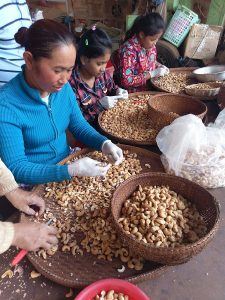Type of Dialogue
Stage
Convened by
Language of Dialogue Event
Date/time
To:
City
Geographical focus
Format
Please review the details below for registration information if available or contact the Convenor if you would like to attend.
Curator
Description
No country in the world in 2020 was spared the direct (health) and indirect (socio-economic) impacts of COVID-19; the impacts have amplified vulnerabilities including malnutrition and poverty but also shed light on opportunities within the food system. Learnings from any crisis can be harnessed to improve systems and prepare for future shocks and stresses. Prior to the onset of COVID-19, Cambodia already suffered from high rates of malnutrition and poverty; one in three children are stunted (low height for age) and one in ten are wasted (low weight for height). Looking forward, what does recovery and building back better from COVID-19 mean for Cambodia’s food system?
Studies have recognized that “A population that is chronically malnourished has little capacity to withstand and recover from shocks” (IDS 2020) and that poverty reduces the ability to bounce back. According to FAO’s Chief Economist Máximo Torero, “we need to link recovery plans with catalytic investments and investment with significant returns on reduction of undernourishment to achieve SDG 1 (No Poverty), 2 (Zero Hunger) and 10 (Reduced Inequalities).” So what are game changing solutions to ensure that the food system nourishes all, offers resilient livelihoods, and stewards the environment? This will be the topic of the Food Systems Dialogue to take place on May 27th.
Cambodia already has elements in place to prepare for future shocks, think through recovery and building back better. For example, the 2nd National Strategy for Food Security and Nutrition (2019-2023), which is led by the Council for Agricultural and Rural Development (CARD) under the Chairmanship of the Deputy Prime Minister and Chairman of CARD, HE Yim Chhay Ly, offers such a framework. The plan embodies both sector-led and multi-sectoral joint actions that include nutrition specific and sensitive interventions to be delivered across several sectors and systems. In particular, joint multi-sectoral coordination efforts are focused on six areas: Healthy Diets; Nutrition-sensitive WASH; Food Value Chains, Food Safety and Fortification; Social Assistance; Community-led Nutrition; and Disaster Management and Climate Change. COVID-19 requires us to accelerate action on these six areas and beyond.
Topics to be discussed at the dialogue will include:
- Introduction: what have we learned and what does it means to build back/forward better
- Game changers: importance of healthy diets during pandemics and building back stronger
- Game changers: averting a future crisis by improving food safety/transboundary diseases
- Game changers: vertical and horizontal expansion of shock-responsive social protection
- Game changers: cold storage for value chains that nourish consumers and offer resilient livelihoods
- Game changers: win wins (environment, social, and economic)
- Game changers: bridging the humanitarian-development divide
Acknowledgement


